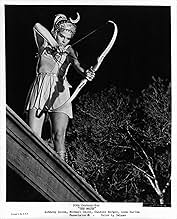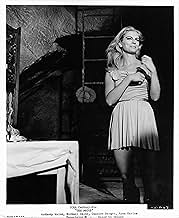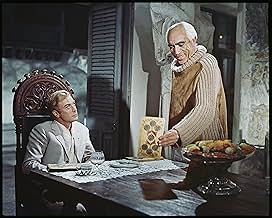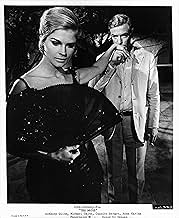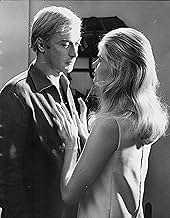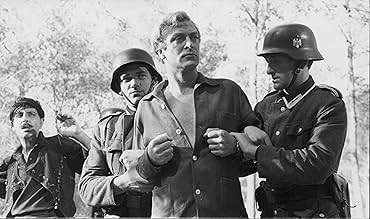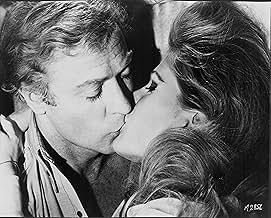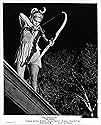Sur une île grecque, un magicien sophistiqué entraîne une jeune fille fragile et un intellectuel anglais dans des jeux psychologiques. Inspiré d'un roman de John Fowles.Sur une île grecque, un magicien sophistiqué entraîne une jeune fille fragile et un intellectuel anglais dans des jeux psychologiques. Inspiré d'un roman de John Fowles.Sur une île grecque, un magicien sophistiqué entraîne une jeune fille fragile et un intellectuel anglais dans des jeux psychologiques. Inspiré d'un roman de John Fowles.
- Nomination aux 1 BAFTA Award
- 1 nomination au total
Danièle Noël
- Soula
- (as Danielle Noel)
Andreas Malandrinos
- Goatherd
- (as Andreas Melandrinos)
Avis à la une
Fowles' first novel became the darling of the emerging counterculture of the 60s. It fit a handy niche of layered narratives, connected in ways that emulated the emergence of "secret" cosmologies. By itself, it created a little stir because of the way it was folded by a certain kabbalistic technique while including reference to that technique.
The history of this makes it essential viewing. Its Fowles' first novel, partially autobiographical, taking over a decade to write. Its grand, risky, sloppy. It is perfect in its way, being as confusing in how it is written as the narrator within is. Its a happy accident that its deficiencies increase the effect.
The screenplay is quite a bit more incompetent and at the same time leaving out most of the ambiguities in the story. So the film is a disaster. Fowles would later straighten up the narrative in the novel and issue what in the film world would be a "director's cut" which tries to keep the ambiguities in the story but reduce them in the narration. Its far less effective than the original.
So why should you see this? Because it is a historical document that changed things significantly. Its based on two sources: one was a then little-known set of Kabbalistic lessons on Tarot ambiguities. The other is a piece of literary theory from the thirties: "Seven Types of Ambiguity." (Don't search it out: it is far less interesting than the title implies.)
Fowles simply conflated his own life (and remorse over handling a romance) into these two notions, deliberately trying to capture the seven types which incidentally inform my study of narrative folding.
In September of 1966 while in Spain for the filming of "How I Won the War," John Lennon, who hardly read anything, read this (twice, once heavily rugged) and it changed his life, the direction of The Beatles and hence enfranchised a new form of narrative. (He called and later visited Fowles while this script was in development. There is no artifact of that in the script.)
Its not Joyce, but it is the child of what he envisioned, dumbed down, but still raising the bar for narrative structure and affecting I assert nearly everything.
Ted's Evaluation -- 3 of 3: Worth watching.
The history of this makes it essential viewing. Its Fowles' first novel, partially autobiographical, taking over a decade to write. Its grand, risky, sloppy. It is perfect in its way, being as confusing in how it is written as the narrator within is. Its a happy accident that its deficiencies increase the effect.
The screenplay is quite a bit more incompetent and at the same time leaving out most of the ambiguities in the story. So the film is a disaster. Fowles would later straighten up the narrative in the novel and issue what in the film world would be a "director's cut" which tries to keep the ambiguities in the story but reduce them in the narration. Its far less effective than the original.
So why should you see this? Because it is a historical document that changed things significantly. Its based on two sources: one was a then little-known set of Kabbalistic lessons on Tarot ambiguities. The other is a piece of literary theory from the thirties: "Seven Types of Ambiguity." (Don't search it out: it is far less interesting than the title implies.)
Fowles simply conflated his own life (and remorse over handling a romance) into these two notions, deliberately trying to capture the seven types which incidentally inform my study of narrative folding.
In September of 1966 while in Spain for the filming of "How I Won the War," John Lennon, who hardly read anything, read this (twice, once heavily rugged) and it changed his life, the direction of The Beatles and hence enfranchised a new form of narrative. (He called and later visited Fowles while this script was in development. There is no artifact of that in the script.)
Its not Joyce, but it is the child of what he envisioned, dumbed down, but still raising the bar for narrative structure and affecting I assert nearly everything.
Ted's Evaluation -- 3 of 3: Worth watching.
As much as I adore complex films, and philosophy, I dare you to watch this film and understand it to it's fullest - if you haven't read the novel yet, that is.
The unforgettable insights offered by John Fowles' book are completely gone, as the film turns into an empty allegory, aiming towards an arty approach, that backfires miserably. I guess the producers of 'The Magus' thought that art translated soft porn sequences, senseless dialogue chanted by awkwardly miscasted actors and poor editing.
Nevertheless, Anthony Quinn was quite good as Conchis, and Anna Karina was fair as well... if given more time, she would give a knockout of a performance ( 'Yes Or No... Yes Or No... YES OR NO!" )... at least they balanced the horrendous performances of Michael Caine ( "To Hell With Anne... ") and Candice Bergen ( "No... To Hell With Nicholas!" ) . I say that because I have recently finished an acting course, so I would understand more thoroughly acting itself, and I realize how hard it is to ACT... but anyone could do better than that!
But some good points that deserve notice are the stunning camera work, and the lovely soundtrack by John Dankworth.
Well, all things considered, this movie found me rather puzzled, yet, unmoved, and irritated. A glimpse at John Fowles' beautiful writings will make you want to smack the producers' faces even more. :)
Well... you've been warned.
The unforgettable insights offered by John Fowles' book are completely gone, as the film turns into an empty allegory, aiming towards an arty approach, that backfires miserably. I guess the producers of 'The Magus' thought that art translated soft porn sequences, senseless dialogue chanted by awkwardly miscasted actors and poor editing.
Nevertheless, Anthony Quinn was quite good as Conchis, and Anna Karina was fair as well... if given more time, she would give a knockout of a performance ( 'Yes Or No... Yes Or No... YES OR NO!" )... at least they balanced the horrendous performances of Michael Caine ( "To Hell With Anne... ") and Candice Bergen ( "No... To Hell With Nicholas!" ) . I say that because I have recently finished an acting course, so I would understand more thoroughly acting itself, and I realize how hard it is to ACT... but anyone could do better than that!
But some good points that deserve notice are the stunning camera work, and the lovely soundtrack by John Dankworth.
Well, all things considered, this movie found me rather puzzled, yet, unmoved, and irritated. A glimpse at John Fowles' beautiful writings will make you want to smack the producers' faces even more. :)
Well... you've been warned.
A couple of years ago someone I worked with had a copy of this film and I dubbed a copy for myself. He mentioned the Woody Allen quote about the film which made me laugh, but I guess it also made me a little wary about watching it. I finally pulled it out last night and popped it my VCR. When I wasn't confused there were certain scenes that grabbed my attention. Oddly enough I have a copy of the novel which I haven't read (I say oddly because there are very few books that enter my sphere that go unread, so I'm sure I'll get around to it eventually). As the movie was playing I'd pick up the novel and think, "Boy this sure is a thick book. I bet there are all sorts of thoughts and ideas the characters have in it that aren't finding their way into the film." This isn't necessarily a bad thing, and I don't think movies based on literature have to be a dedicated recreation of their source material, but the film had an overall vague feeling to it. I'm guessing that many people who detest "The Magus" probably don't care for the ending. I know it left me feeling less than satisfied in relation to all the scenes that preceded it. It seemed like what with all that Michael Caine experienced during the course of the movie that a more profound conclusion was in order.
This movie received a critical mauling. Even the celebrities hated it, one of them (possibly Woody Allen) saying that if he had to live his life again he would do everything the same except he wouldn't go to see The Magus! However, I don't think it is that bad. It certainly isn't particularly good, but it carries a certain fascination in the way that it unpeels a multi-layered plot in a gleefully playful way. The main shortcoming is that some plot points are dealt with unclearly, making it a bit tricky to figure out exactly what is going on. The ending in particular seems to be a bit confusing. However, on the plus side, there are some powerful visuals. There are also strong leading performances from Michael Caine and Anthony Quinn, as well as a memorable turn from Anna Karina as one of Caine's ex-lovers. Candice Bergen gives a terrible performance, but perhaps the character she is given to work with was unplayable anyway. Don't listen to the critics. See this one for yourself and judge it on your own terms.
This film came out when I was a senior in college, and I loved it at the time. I thought it was really innovative and thought-provoking. It was also my first introduction to Eliot's famous fragment, which remains a particular favorite. It may be a difference in perceptions that is the root of the film vs book controversy because personally I can't stand Fowler as an author. I think he's extremely pretentious, not to mention boring. But that's just me. Other's like the book and hate the film because of their own perceptions. See the film and judge for yourself. I think it's definitely worth it.
Le saviez-vous
- AnecdotesSir Michael Caine lists this, along with L'Inévitable Catastrophe (1978) and Ashanti (1979), as one of the worst movies he ever made. This is mainly down to the fact that no one, least of all the audience, knew what it was about.
- GaffesIn the rented room where the English professor will live while continuing the teaching work of his predecessor in the so-called Greek island, there is a rather conspicuous historical XIX century Spanish painting by José Casado del Alisal which represents the first defeat of Napoleon's armies in Spain, in the city of Bailén, where Marechal Philippe Antoine Dupont de l'Estang surrendered to inexperienced Spanish General Castaños on 19 July 1808. Not quite a Hellenic topic, really.
- Citations
Maurice Conchis: All men feel the need to risk death at least once in their life. War is a very unscientific answer to that need.
- ConnexionsFeatured in Denúncia Vazia (1979)
Meilleurs choix
Connectez-vous pour évaluer et suivre la liste de favoris afin de recevoir des recommandations personnalisées
- How long is The Magus?Alimenté par Alexa
Détails
- Durée
- 1h 57min(117 min)
- Couleur
- Rapport de forme
- 2.35 : 1
Contribuer à cette page
Suggérer une modification ou ajouter du contenu manquant

